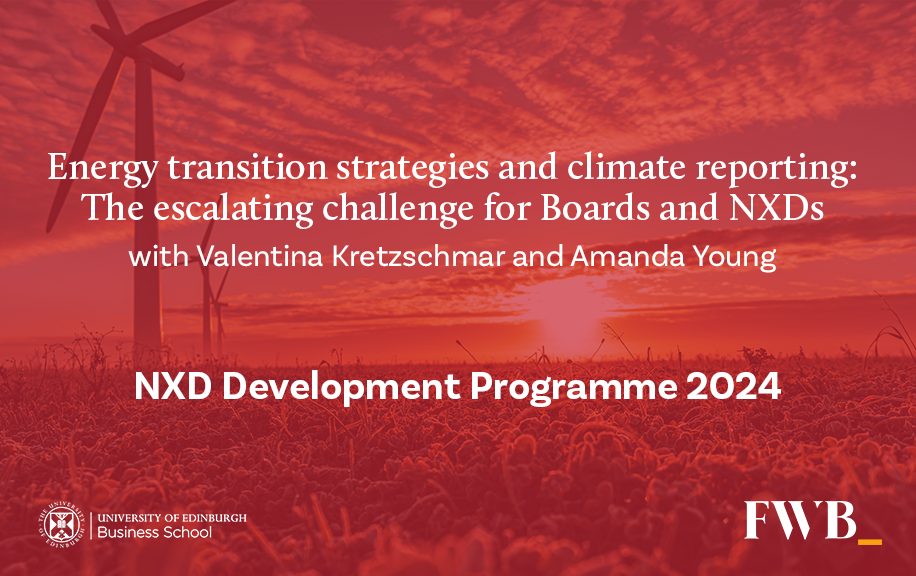Contact the team at FWB to discuss your individual or company requirements, or to discover more about our specialist services.
Building and Driving High-Performance Teams
25 November 2024
- Leadership Development

Insights from Session 5 of the Executive Leadership Programme
Session 5 of The Executive Leadership Programme (ELP) developed and run by FWB and The University of Edinburgh’s Business School focused on ‘Building and Driving High-Performance Teams’. The guest speaker was Clive Miles, HR Director for Barclays UK Every Day Money Management and Life Moments, BUK COO and Private Bank and Wealth Management COO.
The session was designed to explore how individuals work differently in teams and the science behind high-performing teams. Clive shared his extensive experience and led discussions on team selection and resetting high-performing teams.
Key topics discussed included:
- Empathy and High-Performance Teams: Empathy in the workplace can significantly enhance team dynamics and performance. It helps in reducing stress and fostering a supportive environment as this extract explains.
.
- Benefits of Empathy: as it can lead to better interpersonal relationships, increased trust, and a more cohesive team. It also helps in understanding and addressing team members’ needs and concerns.
- Science of High-Performing Teams: The session highlighted the importance of empathy in building high-performing teams, referencing studies and practical examples.
Clive shared his diverse career journey, including his time in the armed forces and his role at Barclays. His experiences provided valuable insights into leadership and team dynamics. He emphasized the importance of self-awareness, understanding team dynamics, and aligning team goals with organizational objectives. Clive also discussed how leaders need to adapt their style based on the team’s needs and the business environment.
The session covered 80 years of behavioral science research on team effectiveness, including studies from World War II. Concepts such as coordination issues, groupthink, and social loafing were discussed as factors that can hinder team performance. Conversely, knowledge sharing, group flow, and diverse perspectives can enhance team effectiveness. Real-world examples from various team settings, including military and corporate environments, were used to illustrate these concepts.
The session also covered the Neuroscience of Teams, and considered:
- Social Wiring: Humans are wired to be social, and this affects how we work in teams. Mirror neurons and social bonding play a crucial role in team dynamics.
- Brain Synchronization: Studies show that when people work effectively in teams, their brains can synchronize, enhancing creativity and performance.
- Stress and Empathy: Empathy can help reduce stress, which is critical for maintaining high performance. Stress can negatively impact decision-making and team dynamics.
.
As usual there was a lot of interaction and group activity and participants engaged in exercises to identify key characteristics and skills for high-performing teams. They discussed the importance of resilience, adaptability, and independent thinking. Scenarios were presented where teams had to reset after a crisis and participants discussed strategies for rebuilding trust, aligning goals, and ensuring effective communication. Clive shared personal experiences from his military and corporate career, highlighting the importance of leadership in crisis situations, including the need for leaders to understand their strengths, weaknesses, and the impact of their behaviour on the team. He emphasised the importance of having a clear sense of purpose and being authentic, together with regular feedback and a commitment to continuous improvement.
In conclusion, the session emphasized the importance of alignment, trust, and communication in building high-performing teams, and participants were encouraged to apply the insights and strategies discussed to their own teams and organizations, focusing on empathy, adaptability, and continuous improvement.
The sixth session of ELP 2024 addresses a ‘Board Readiness and Governance’ with Angela Seymour-Jackson, Chair at Page Group and Senior Independent Director at Trustpilot. She will be joined by an academic lead, Prof. John Amis, Chair in Strategic Change Management and Organisation and Co-Director of the Centre for Strateic Leadership at the University of Edinburgh.
Jointly run by FWB and the University of Edinburgh Business School (UEBS), The Executive Leadership Programme is designed at enabling the next generation of leaders across multiple ownership classes or organisations within a broad range of private, public and non-profit sectors.
For more information on ELP 2025 please contact elp@fwbltd.com.




